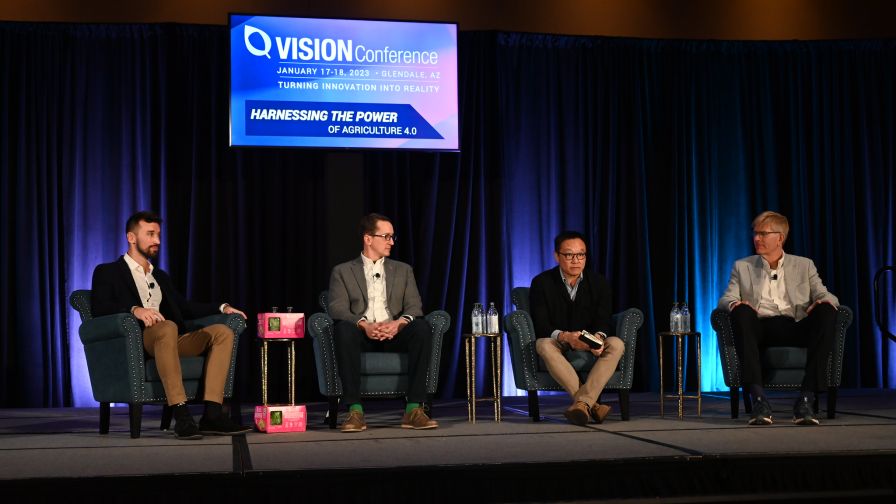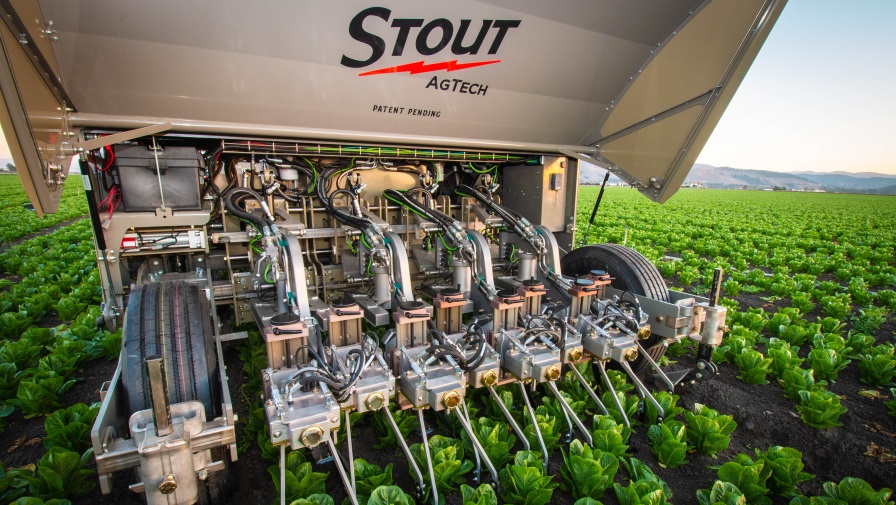Long-Term Prospects Look Bright for Controlled Environment Agriculture

Industry insiders discussed the current and future state of controlled environment agriculture (CEA) during the 2023 VISION Conference in Glendale, AZ. [Pictured from left] Henry Gordon-Smith of Agritecture; Dave Vosburg of Local Bounti; David Chen of Equilibrium Capital; and Paul Sellew of Little Leaf Farms.
Photo by Chuck Zimmerman

While leading a panel discussion CEA and the future of food at the recent Vision Conference, Henry Gordon Smith, Founder and CEO of Agritecture, said he thinks today’s CEA troubles are a hiccup on forward progress. Recent operations have shuttered primarily because of dramatically increased fuel costs, although typical problems like poor planning also hamstring success. Still, he is undeterred.
“We really are on a mission to accelerate climate smart agriculture. It will allow us to grow the food in certain places where we weren’t able to before; to use less water, use less land,” he said, “And to do that globally.”
Local Bounti is a company with greenhouses in six locations in the U.S. and is interested in not only lowering water, land, and chemical usage, but delivering a fresher, higher-quality product that consumers will pay more for, and to create innovative products that encourage consumers to eat more fresh produce.
“All these technologies are not panaceas, they’re tools that we used effectively in different geographies at different times for different crops to generate profit,” said David Vosburg, Chief Innovation Officer of Local Bounti. “So, that’s the first point. The second is unit economics. This is the driver of everything that we do. The third point is with CEA, specialty crops have an opportunity to be different. It’s cleaner, it has a longer shelf life, and has a potential to go into value-added products in a new way that can delight the customer.”
A publicly traded company, Local Bounti halved its losses from 2021 to 2022, and analysts predict the company will break even in 2024, assuming an aggressive growth model of 59% year over year, which is not impossible for a company in growth mode.
Dave Chen, Founder and CEO of Equilibrium Capital, said his company got into CEA in about 2015 because it saw that Walmart had concerns about its fresh produce supply.
“They were increasingly concerned about the resilience of their fresh produce supply chain because of the volatility that they were starting to see, because so much produce comes from California and they were having drought and water use issues,” Chen says. “We drove around Holland and asked why Europeans have 45,000 acres of greenhouse production, and the U.S. has less than 1,000 acres. We have no doubt that controlled-environment agriculture will happen in the U.S., and we want to be able to fund and guide good businesses in the industry.”
Fellow panelist and Founder and CEO of Little Leaf Farms Paul Sellew calls himself a farm boy, and says being profitable was drilled into his head since he drove his first tractor.
“I don’t view this as a tech play,” he said. “This is about producing food and supplying it to a very competitive retail grocery customer that is very focused on what they’re buying for. We have been profitable since our second year in business.”
The market shows a shake-out happening among producers, because of rising costs and poor business models, but these experts believe that once the industry is over the trough of disillusionment that is happening right now, the future for controlled-environment agriculture is bright.
“Prior to 2022, you could say money was free,” Chen said. “Right now, we are in a rising interest rate inflationary environment. The money losing business models that are out there do not have investors willing to continue to support them, we’re already seeing bankruptcies and layoffs. And I think we’re in early state right now. But having said that, winning business models will emerge as well.”
To read the article in its entirety, continue at GreenhouseGrower.com.








